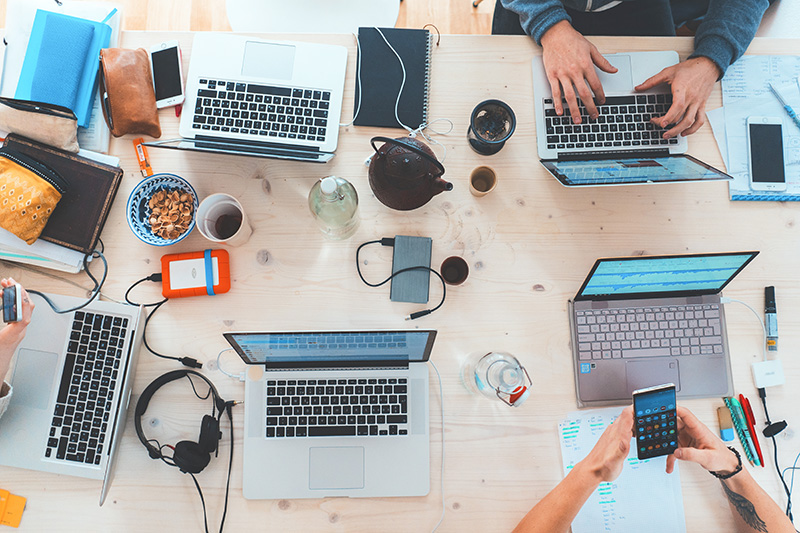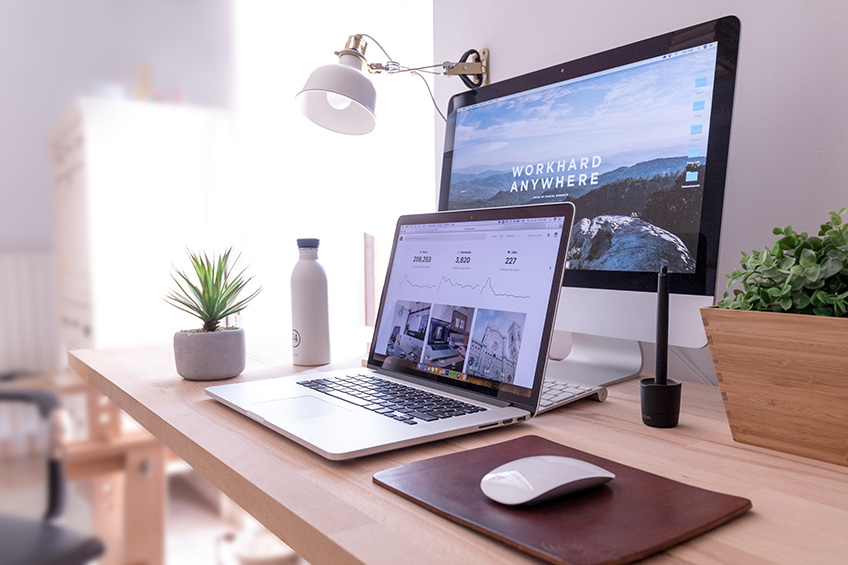Becoming more productive means to work efficiently, but also to use your time in such a way that will allow doing other activities. Below are dozens of great tips that will help you become more productive and achieve more.
1. Get started!
One of the problems that make us less productive is the fact that we create non-existent issues: either the pencil is not sharp enough, the light is not right, the chair is not comfy.. and so on. All these issues will keep us from starting to work. Drop these excuses and just put in the work.
2. Divide your work in smaller steps.
You can complete a big project faster if you divide it into several smaller stages. This way you can concentrate on one step at a time and you’ll become a lot more productive.
3. Isolate from the outside world when you are productive.
When things go hand in hand, isolate yourself from the surrounding world. Don’t let those around you bother you, consume your precious time and distract you exactly when you are into focus.
4. Stop worrying and just put in the work.
Most projects may seem complicated at first, and you’ll think you may not have enough time to complete yours. The more you think about any issues, the less chances you’ll get to complete that project. Focus and keep working, and solutions will also begin to appear.
5. Leave perfection for the end of the project.
Do the work at hand on time. If the primary purpose is to make things perfect, you may not be able to finish something in time, or at all. First, do the necessary work, and only then think about ways to optimize or improve various aspects.
6. Take a break of 20 minutes every 1.5 hours.
Taking frequent breaks from sustained work will increase productivity by up to 16%. You can relax in a short walk, or just stretch your body in whatever room you find yourself. A few minutes of meditation with closed eyes and deep breathing will also do wonders.
7. Neglect the phone.
Breaks during your work activity should not involve a phone conversation unless necessary. Nowadays, our phone is one of the most distracting tools we carry around (except when the phone is being used for work).
8. The secret of the best workers.
Some of the most productive people, divide their work into 90-minute sessions and work no more than 4 hours a day. It has been proved numerous times that a decreased work schedule will improve productivity. Workaholics can put in more and more work hours while still keeping productivity at high, but health is most of the time neglected by these people.
This is explained by the fact that people will not get overwhelmed with a busy schedule, harming their productivity, and also by the fact people can dedicate better to the work if they know they are going to have plenty of free time after the tasks are completed.

9. Keep your workspace clean and organized
When you have a clear desk and office, chances are you’ll have a clearer mind. Hide unnecessary things and turn off any notifications. Try as much as possible to have natural light in your office; it will make you happier and help you become more productive.
10. Take a break for a short nap.
If time and work allows it, you can sleep 10-30 minutes. A short rest fills you back with energy and can lift your mood and productivity by a lot.
11. Meditate.
It may sound weird to meditate at work, but the more focused we are, the more productive we will be. Meditating at work will reduce stress, frustration, and other negative aspects that can hold back productivity.
Find a quiet place where there are minimal distractions, close your eyes, take some deep breaths and try to be aware of any message your body and spirit sends to you. A few minutes of meditating at work will make you more efficient in the long run. Here is a great resource on diaphragmatic breathing.
12. Wake up in the morning.
The statistics show that the best managers wake up until 6 am. Waking up in the morning has many benefits: peace of mind, extra time before work to do exercises, yoga, play with children, and more.
13. Stay offline if the work allows it.
Social networks, email, chats and other apps are killers of productivity. Get offline while you work, or turn down distracting notifications that can eat up your precious time.
14. Use a to-do list.
Using a to-do list is a must for any person who needs to get organized and accomplish more. To-do lists will not let you forget your tasks and you will know what exactly needs to be completed next. While working on it, by checking your tasks as completed will motivate you to finish the remaining ones.
15. Plan your workweek.
Always plan ahead. Besides working activities, where you prioritize your work, you should also plan recreational activities or even schedule a free day.

16. Listening music.
Music can give you the inspiration you need. Let’s say you have a very long and tedious project to write. The oppressive silence in the library or, on the contrary, the noise made by neighbors around you, can easily distract you from your work.
The solution: make a playlist with relaxing music, preferably instrumental, without lyrics. By listening such music during work, you will notice that it is much easier for you to focus and keep working on your tasks.
17. Complete unpleasant tasks first.
Start working with the most unpleasant tasks in the morning, when you are full of energy. Finally, you will be able to complete the more exciting tasks even if you have less energy near the end of the day.
18. If possible, work one day from home during the week
Changing the surroundings can make you feel better and enables you to work happier. If that’s not possible, make a few modifications at your work place, even the smallest details like some new decorations can make you feel better.
19. Dress properly.
Some people are more productive and focused when they are appropriately dressed. Working in pajamas may be comfortable (maybe as comfortable as earning money in sleep?). However, too relaxing clothes might be too comfy, making you feel relaxed and less inclined to focus on what you have to complete.
20. Turn the bigger tasks in everyday tasks.
Do not be stressed because your duties seem to be huge; look at them as regular tasks and just start working on them. The more you work on them, the smaller they will become (until completion)
21. Highlight your talents.
Each person has individual skills but also weaknesses. When it comes to productivity, you need to understand that in order to do more in a shorter time, you must first identify your talents. Talents are the things or activities that you enjoy doing and which you excel at.
Take a piece of paper and write them down. Once you have identified them, try to use them as often as possible by including them in your daily activities. By repetition, you will reach the master’s degree. In this way, you will be able to showcase your talents, and you will enjoy maximum results, and, at the same time, you will work with more pleasure. That means being more productive.
22. Divide large tasks into segments.
Often it is difficult for us to carry out a job because it is too big, and we keep finding excuses to move it from one day to another. But if we divide this task into smaller steps, we can start working on it more comfortable.

23. Don’t compare yourself to others.
Comparing yourself with other people can demotivate you. You don’t need anyone’s approval to do something for yourself, because each person is unique. Think about what you want to accomplish and what is right for you without adversely affecting anyone. Give yourself the courage to grow at your own pace.
24. Don’t overdo it.
Choose quality, not quantity. Properly appreciate how long it takes you to accomplish a specific task. Try not to overwork; in time, you will start to get tired, stop working, and you will need more time to recover your energy. Nothing is good in excess, including work.
25. Find time to do.. nothing.
You don’t have to do something all the time. Find time for lying down, sitting, without specific thoughts or purposes. Measure time, but don’t believe you’re getting “lost” if you lose the measure of time.
26. Use helpful tools.
When you’re at the computer, use the right tools to save time and be more productive (task lists, automation scenarios, time-saving applications). For offline use, the writing board, a notebook and post-it notes should be enough.
27. Buy an alarm clock.
Use the alarm clock (instead of the one on your phone) to schedule important tasks. The alarm clock on your phone can evade you more easily, leaving tasks not done on time.
28. Don’t do more than one thing at a time.
We always tend to overestimate ourselves and believe that we are capable of doing more than one thing at a time, and doing them all equally well. This is not so true. The focus level on the things you do, can only be 100% if you do them one at a time, not all at once.
29. Drink enough water.
Dehydration of the body can cause headaches or dry mouth. Try to keep a water bottle nearby. You can add lemon juice, ginger, peppermint, or cucumber to boost your metabolism and increase the level of antioxidants in your body. Staying hydrated all the time is an essential think you should not forget doing.
30. Work 15-25 minutes without interruption, before taking a break.
You can use the Pomodoro technique, which has five essential steps and principles:
1. Choose the task you want to accomplish;
2. Set the alarm clock to a specific time (traditionally, 25 minutes);
3. Work on the job until the timer runs out;
4. Take a short break of 3-5 minutes;
5. After four work sessions, take a more extended break of 15-30 minutes.

31. Add diversity in your lunch
First of all, eat healthy. What does this mean? A portion of protein, one of the vegetables, and one of fruits. For example, chickens, carrots, and an apple; or fish, cucumbers, and a banana. A healthy lunch gives you a lot of energy for the whole afternoon, and you can call this “performance fuel”.
32. Practice a sport daily
Some things are essential in life: food, water, a roof over your head, relationships with other people.. but also movement is one of them. Being always in excellent physical condition, you will be happier, more energetic, you can concentrate more efficiently, and you will become much more creative.
You can do stretching, jogging, weight training, or anything that puts your body and blood in motion. If you cannot exercise daily for at least 20-30 minutes, try to be active during the day by other means: get up more often from the chair, walk to the market instead of driving to it, do some exercise in the bathroom or in front of your TV.. There are enough possibilities as long as we really want to do that thing.
